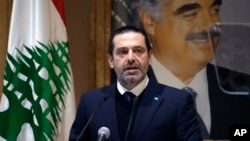Saad Hariri, Lebanon’s leading Sunni Muslim politician and three-time prime minister, has announced that he will not run in parliamentary elections in May and that his Future Movement will boycott the elections altogether. Some analysts say a boycott by Hariri could undermine the plans for a poll in which opposition personalities hope to gain seats in the legislature and change the toxic atmosphere of the country’s politics.
Saad Hariri took up the political mantle after his father, Rafik, was assassinated in Beirut in 2005. Rafik Hariri, a wealthy business tycoon in Saudi Arabia, was one of Lebanon’s most powerful and influential politicians since the end of the 1975-90 civil war. But Saudi Arabia increasingly soured on ties with Saad Hariri as he proved incapable of reining in the Iran-backed Shiite Hezbollah militia’s influence in Lebanon.
In emotional remarks explaining his withdrawal from politics, Saad Hariri said he sees that Lebanon does not have a chance for a positive future with Iran’s growing influence there, its internal divisions, rising sectarian sentiments and the government’s dysfunction.
The next parliament is set to elect a new president in October.
Professor Habib Malik of the Lebanese American University told VOA that Hariri’s political star has been falling for some time, but that there isn’t a clear successor for him.
“He is a spent force. Saad has huge problems with the Saudis. He has other international lawsuits having to do with his company that did work in Turkey and got into legal trouble there. There’s a huge vacuum in terms of credible leadership on the Sunni side. There are kind of puppets or nonentities. They just underscore the frustration in the Sunni community that real true leadership is missing,” Malik said.
Some observers say an election boycott by Hariri’s Future Movement, Lebanon’s largest Sunni Muslim party, could leave his fellow compatriots in disarray and possibly call for an election delay.
Mohanad Hage Ali, a fellow at the Carnegie Middle East Center in Beirut, told Reuters that Hariri’s boycott "pulls the rug from under the whole process and would increase speculation that it might not happen."
But Dania Koleilat Khatib with the Issam Fares Institute at the American University of Beirut disagrees.
She told VOA the decision by him and the Future Movement will not harm elections, but voters will cross party lines and look to others running who align with their views, including the Lebanese Forces, a Christian-based party.
“What they are saying [is that] they want [Prime Minister] Najib Mikati to fill his role. But I am not sure that he can. The Sunni vote will be divided. Some of them will not vote for a Sunni but for whoever they think represents their cause. So, I think some of the vote will go to the Lebanese Forces. The Lebanese Forces are trying to promote themselves as cross-sectarian. So, not only Christian, cross-sectarian,” Koleilat Khatib said.
Samir Geagea heads the Lebanese Forces and opposes fellow Christian, Michel Aoun, Lebanon’s president, and his alliance with Hezbollah.




